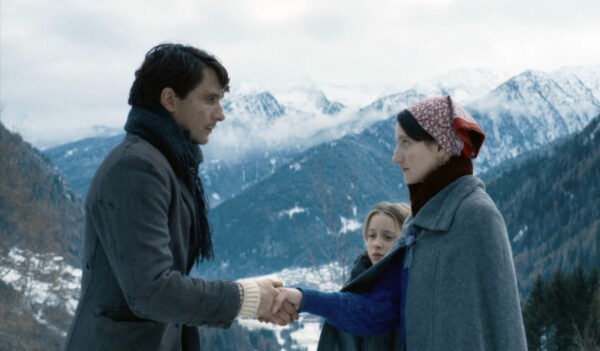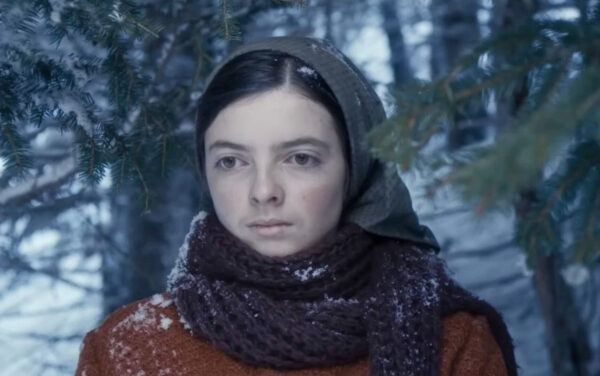The Italian movie Vermiglio premiered at the Venice Film Festival, winning the Grand Jury Prize or Silver Lion “for its ability to portray the rural Italy of the past, while conveying emotions and themes that are universal and still relevant in the present day.” It was selected as Italy’s entry for International feature at the Academy Awards.
I saw it at the AFI Film festival in Hollywood, met writer-director Maura Delpero during and after the post-screening Q&A. Vermiglio will play in theaters in December. Watch the trailer with English subtitles.

Vermiglio is the name of the small village in the Italian Alps, Trentino-Alto Adige region, where the director’s grandparents raised their ten children.
Q: What inspired you to make such a personal movie, about your family’s history?
A: The inspiration for the film has been the most private one could ever imagine, because it has to do with the death of my father, who passed away in 2019. I came to LA and went to a lot of other festivals, I was traveling all around the world to introduce my first movie, Maternal, trying not to think about it. Then COVID came and it asked me to stop, and by stopping all this grief about my dad came out, so one night I had a beautiful dream about a little boy visiting me, who was my father. He resembled a photo of him I knew, when he was about 6 years old, playing in his childhood home in Vermiglio with his siblings, my aunts and uncles. So I began to write as a private way of overcoming this grief, but then I felt that there was something more there, more and more images came to me, so I thought, maybe there’s a film there.
Q: Why did you choose to set the story during the course of four seasons, in the years 1944 and 1945, before and after World War II?
A: The period was suggested by this inspirational dream, because my father was little in those years. But I also found that it was particularly interesting to place the film in those transitional moments, the war and the peace, because it allows us to look at a recent past that still dialogues with us, it’s not an ancient, exotic past, it’s really the day before yesterday. You can see that the mother is my grandmother, the one who gave birth to my father, so there’s still a relation, an inner dialogue. And you can feel it overall in all the female characters, that they are absolutely ancient, they belong to the codes of the period, which was a patriarchal society, but they are already willing to have an auto-determination. Of course, they cannot put it into action, because it’s impossible, but you can feel it. For example, Lucia, the main character, begins as an old-fashioned country girl, and through this tragedy, through the necessity of staying alive, she turns into a woman of our times, because she says goodbye to her childhood to go to work, and goes alone to the city. So she’s kind of a metonym of this passage of time, look at what this woman is doing, why is she not in the kitchen, giving birth to ten children? I wanted to make a film that could go from the past to the modern, from the village to the city, from community to individuality.

Q: The father seems like an unusual man, an elementary school teacher in a small mountain town, with progressive ideas and cultural ambitions, despite never praising his wife’s role as the mother of his ten children.
A: Yes, he’s a very strange figure, and he’s inspired by my grandfather, because his roots are that of a peasant, but we never knew why he had this cultural interest, trying to get books and records to come from the city, like culture arriving to the top of the mountain. He’s both ancient and modern, he’s an outsider, because of his pedagogy; while at that time a teacher was hitting your fanny, he brings culture to the school, but at the same time he’s really an old-fashioned pater familias. So he’s a mixed character, that’s why it was difficult to find the right actor. I spent a lot of time in the place with Tommaso Ragno, because most of the actors come from the area, but I asked him to come and stay in the bars with the people, because I was always telling him, you’re special, you have this particularity, but you come from there, you’re still a mountain man. So we worked a lot on this ordinary man that has something extraordinary.

Q: For me, since I was born in Italy only a few years after World War II, I recognized the struggle of Ada, Lucia’s teenage sister, who feels guilty about her sexual desires, punishes herself by eating chicken shit, goes to confession to talk to the priest, but ends up choosing to become a nun.
A: That’s part of the life at that time, but also it’s part of the gender, because Ada shares with the father the same erotic book, but for him watching that book means smoking a cigarette, for her it means eating chicken poop. So it’s different, she doesn’t allow herself to feel desire, because it’s a Catholic world, in which female desire is not even imagined. You cannot talk about these things in this time, you cannot even tell clearly that you have menstruation (as younger sister Flavia does), because you think that your body is dirty. Ada does not want to marry because, when she gets pregnant and has a child, for forty days she cannot go to the church, the only place where she is listened to, which is incredible, you give birth and it’s painful, and you also have to stay home, because you’re told that you’re dirty. Ada is very intense, but she cannot say or express what she wants, she’s interesting because she has a lot of inner life, more than the others. The only other moment in which we can see her expressing a little bit more is when she meets Virginia, and there’s this sexual attraction, but for me it’s more a matter of solitudes, of outsiders that meet and find their place in a society in which it’s difficult to find your own place. At the end Ada respects the codes of the time, but paradoxically she finds her freedom in the cloister, she finds what Virginia Woolf would have named “a room of her own,” in a place that now we consider kind of a prison, but for her it’s freedom, because otherwise she would maybe have married and had children, she couldn’t have studied, and would not have been allowed to smoke at all. So in a way she is a very modern character, all her struggle has to do with the time, her gender and her intensity.
I will note that Maternal, the first feature film by Maria Delpero, was inspired by her own experiences as a teacher in Buenos Aires hogars, homes for teenage mothers often administered by nuns in Argentina.
I was aware of the Latin American tradition of Cuarantena, 40 days of post-partum bonding between mother and baby, but I never heard that it was practiced in Italy, where Quaresima refers to the 40 days of Lent.
One particularly lovely scene of Vermiglio for me, a classical music and opera lover, was when the teacher plays The Four Seasons violin concerto by Antonio Vivaldi for his young students, as a learning tool to appreciate the power of music.
Cineteca di Bologna presented an homage to Maura Delpero on November 7-8 by screening her two features and her two documentaries: Signori professori (2008), Nadea e Sveta (2012).
Vermiglio showing as of January 3 at the Laemmle Royal in Los Angeles. Watch interview with Maura Delpero.


